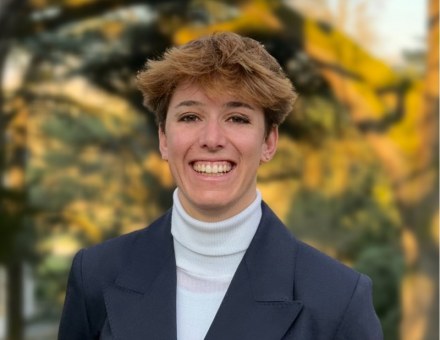One of the outstanding features of emlyon’s MSc in International Hospitality Management is the time all students will spend in locations in France and abroad on Hospitality Weeks. These intensive learning trips provide in-the-field insight into the many aspects of the industry as practiced in other parts of the world and in different specialized areas. Current student Cesarina Criscione tells all.
What factors made you choose emlyon and the MSc?
“The Hospitality Weeks were among the strongest selling points for me, as you get the chance to explore three specific areas of the hospitality industry in three different locations (Lyon, London and Paris) over a sustained period of one week for London and five months for Lyon and Paris. Add to this the International Term we’ll be spending in Las Vegas, and you have a program that is not just international in name and also truly immersive in nature.”

Did you opt for the program with a career path already in mind?
“Definitely. I think that the hospitality industry in general is one where you’re more likely to gravitate towards an international career, working potentially for big groups that are present around the world or smaller groups offering the opportunity for professional mobility abroad. I’d already studied both in my native Italy and in Switzerland, so the move to France was another reason for someone with my international background and the clear intention of starting my career in another country. I’ve always wanted to see how business is done elsewhere in the world, so having established the industry in which I want to build a career, I then identified the business school and MSc that ticked all the boxes in terms of learning opportunities. You also have the added bonus of Paris, the city with the most Michelin-starred restaurants and palace hotels, and France in general, the country that hosts Bocuse d’Or and represents a great place to learn and to grow into hospitality.”
How do the Hospitality Weeks fit into the curriculum?
“The Lyon segment (which was concentrated on food service management) was held very early on in the academic year as part of an accelerated track designed to get everyone up to speed before entering the nitty gritty of the curriculum. The Innovation-focused London part then took place mid-semester in November, followed by Paris in late January, where the emphasis was on hotels and luxury. The Las Vegas part is scheduled for Spring/early-summer and will be dedicated to the hospitality and casino industries that are so important to the area. Preparatory work is required in advance of each Week, for which our Program Coordinator briefs us on who and what we will visit and identifies the aspects on which we should focus once on site.”
What are the learning objectives?
“During our visit, we try to grasp the market under analysis in its entirety – its specificities, what is special about each establishment that we’ll visit, the location, the target customers, pose the right corporate questions to the industry reps we meet. However, each trip is also designed to be operational, with ample time dedicated to the actual services delivered by the places we visit. We’re assigned into groups, meaning we’re not all discovering the same hotels or restaurants, nor exclusively luxury establishments but rather a good blend.
“Visits are guided either by general managers, HR, or events managers of the host businesses, so the format is not unnecessarily standardized. In some places we’ll find out more about commercial or marketing activities, in others personnel issues or revenue management. Variety is one of the keys to the success of each Hospitality Week.”
How would you describe the student experience through these trips?
“Intensive, in the most positive sense of the word! You’ll be visiting multiple properties in detail, examining crucial aspects of the way they do business, so you need to come prepared and get the very most out of each visit and the knowledge you’ll gain from the people you meet. On a more personal-professional level, you may just get a taste for the area of the industry that appeals to you most and could end up being the career direction you take. Different industries and businesses have different requirements of their employees, so the Hospitality Weeks give you an invaluable taster for where you think you might fit in the future.”
What were the main surprises or challenges?
“Each of the markets we discovered are uniquely distinct from one another. Lyon was a bit more traditional and arguably still is, but we got to see how hospitality in the area is innovating and changing. London is, by definition, a lot more varied and trendsetting, which then contrasts with Paris where tradition is still very heavily leveraged as a selling point. These marked differences between the locations and industries came as a surprise and a challenge to get our heads round, but also one of the most positive takeaways of the three trips.”
What recommendations would you make to students considering such an experience?
“I couldn’t recommend the program strongly enough, and the Hospitality Weeks are a perfect example of the way it provides you with so many different perspectives on so many aspects of the industry. You gain truly three-dimensional insight, gain hands-on experience and also acquire the required academic foundation needed to make it in Hospitality as a career.”


